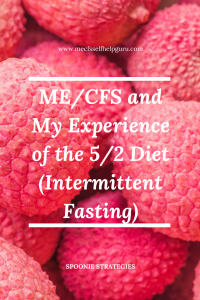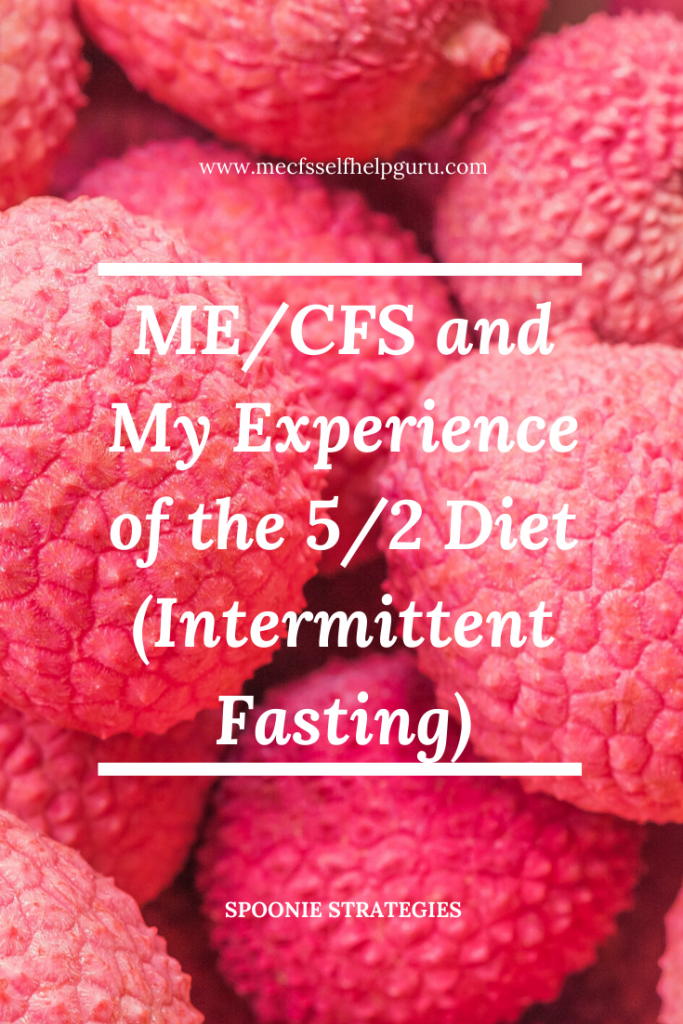Up until now I’ve been a bit reluctant to talk about the fact that I’ve been following the ‘5/2 diet’ for about a year now. I have to admit that I didn’t consult my doctor about it (as we should do whenever we want to try a new weight loss program) and I didn’t want to encourage anybody to do something that was really just an experiment for me. But now others are expounding the benefits of intermittent fasting for people with ME/CFS and Fibromyalgia I want to share my experience. See this recent Health Rising post.
I first explored the idea of it because my weight had crept up and I wanted to support my Mum in her attempt to lose weight, so we were planning on trying it together. But after reading Dr Michael Mosley and Mimi Spencer’s book: The Fast Diet: The Secret of Intermittent Fasting – Lose Weight, Stay Healthy, Live Longer. I was even more attracted by the potential health benefits.
Primarily I wanted to stabilise my blood sugar levels. I used to have terrible carbohydrate cravings and moments when I’d get so hungry I couldn’t focus on anything except how I could get to eat something. I knew this was related to blood sugar issues and I was already following a low carb diet which was helping a little, as were the chromium supplements I’d been advised to take by a nutritionist, but my symptoms weren’t gone completely. I was very concerned by the fact that unstable blood sugar can be a precursor to developing full on diabetes in later life. I was also intrigued by the promise that during fasting days your body goes into healing mode.
The fact that I’m still doing it a year later is testament to the success of my experiment. After a couple of months my unstable blood sugar symptoms disappeared altogether. (Until Christmas when an excess of things I shouldn’t really eat put them back on ‘wobble mode’ and it took a couple of months to get rid of them again). I found that I easily lost the weight I had gained. An added benefit was that my gut symptoms improved a little too. On my two fast days I was really good about not eating any foods that have a potential to aggravate my gut symptoms! To avoid losing too much weight, sometimes I only fast one day a week or sometimes I have a slightly higher calorie intake on the fasting days.
The important thing with intermittent fasting is to do it properly; it’s not about not eating! I would recommend reading the Fast Diet book before you decide to take it on and Dr Craigs blog also gives some very important tips.
As I understand, there are 3 important features to intermittent dieting:
- To have a 16 hour fasting period (which isn’t that hard when 8 hours of that is sleep)
- To have all your days food (500-600 calories) in a 6 to 8 hour window.
- To avoid carbohydrates except for the simple carbs found in non-starchy vegetables and low GI fruit.
How this works for me is that I eat a late brunch (11ish) and an early dinner (5 ish) and then I manage two 16 hour fasts either side of my meals. That is, from 7 the night before, when I make sure I finished eating that night’s meal, till 11am on the fasting day and then from 5.30pm on the fasting day until breakfast the next morning at about 9.30am. I tend to eat something like half a grapefruit or some berries followed by a boiled egg for brunch and a vegetable chilli made with azuki beans (without rice) for dinner.
I found the hunger pangs a little difficult at first but it is true that if you stick with it they calm down after a couple of weeks. I also found that eating an early dinner satisfies the worst of them and it was easier to ignore them in the evening.
 I can’t say that I noticed any improvement to my overall health during my first 6 months of fasting but I do always feel pretty good the day after a fast. My health has also improved considerably over the last 6 months, which it is mostly to do with me getting my ferritin levels back up to normal after them being ridiculously low. However I do wonder if intermittent fasting has made some small contribution to my improvements.
I can’t say that I noticed any improvement to my overall health during my first 6 months of fasting but I do always feel pretty good the day after a fast. My health has also improved considerably over the last 6 months, which it is mostly to do with me getting my ferritin levels back up to normal after them being ridiculously low. However I do wonder if intermittent fasting has made some small contribution to my improvements.
Do you have experience with intermittent fasting? Have you noticed any health benefits?
A small favour: please could you rate this post using the stars below the related posts. Thank you!






Very interesting reading. Its something i have considered myself but its taking the plunge off my other diet
Its lovely to hear from you! Good luck if you decide to experiment with intermittent fasting. I’d love to hear how you get on. Wishing you improving health and happiness!
Great to hear! So much of living with a chronic illness is self experimentation. Even the slightest improvement in symptoms can mean great hope for those with more severe cases.
Best!
Wow, another one of us 🙂 I suffered with me/cfs for many years. Like you the weight started creeping up, and I watched Michael Mosley’s documentary. I had some hopes for new brain cells and maybe shed a few kilos.
Actually, the effect came almost instantly. After 3 -4 fast days over 1,5-2 weeks I suddenly felt full of energy! I took the car, drove up a mountain and went skiing all by myself! 6 mnd prior I was the sickest I had been.
I didn’t get very far skiing as I had very low endurance, but immidiately started running regularly. My head aches dissapeared, my skin cleared, and then I read one place about ME being inflammation of the brain, and another place about fasting reducing inflammation. Voila, there had to be a connection.
I started 5:2 february 2014, and keep it going. Gained back a few kilos from my thinnest period, for a total weight loss of 12 kilos (initially I lost 14 kilos in 4 months). And I feel 90% healthy. It’s amazing. 5:2 saved me, and I never intend to stop. I really hope this can help others suffering from inflammation, there are a lot of illnesses connected with it. 5:2 could actually be a revolution, but I don’t believe all people would be willing to commit. Too bad.
Hope you still are going strong!
best wishes from Scandinavia 🙂
Interesting blog. Have had CFS for over 10 years now… and digestive problems too.
I do a gentle intermittent fast – basically shifted evening meal forwards to 5.30pm – so I usually fast from 5.50pm till about 8.30am following day, works out at 14-15 hour fast each day.
Have definitely found it helps, more energy, clearer skin, improved digestion, clearer head, improved sleep, waking up earlier without ‘hangover’ feeling a renewed enthusiasm for life again. I also lost about 20lbs which has stayed off… as still I can’t do vigorous exercise its great to slim down again in middle age. I understand IF dieting is also good for reducing blood cholesterol etc.
That’s amazing Will! Thanks for sharing your experience which will surely inspire others!
Hi, I did this after the reading the book, and although I lfound it ok to begin with it actually made me crash. If you have any kind of thyroid issue either hashimotos prior to or something that is milder but related to your m.e I would advise you not to do this diet. The reason is that fasting triggers a mechanism whereby t4 is not converted into the active t3 that gets into r cells and provides energy, but into reverse t3 which blocks the receptors and so leads to blocking thyroid take up, and therefore energy in the cells. This is an evolutionary method for conserving energy during starvation low food times. The only thing that works if you must is a paleo with high veg content because in this you don’t trigger that mechanism because you don’t go hungry, and a ketogenic diet is meant to be very healing – Google wahls ted ex talk – if you are someone who it suits.
Thank you so much for sharing your experience!There is such a complicated range of illness mechanisms involved in ME/CFS we all have to take responsibility for learning about just what our own individual body needs! And without the help of a battery of specially designed tests, which still doesn’t exist, we seem to have to do this by trial and error. Your feedback though will be helpful to those who know thyroid issues play a part in their illness. Thank You!
I personally do juice fast so there is no crash tho i have hypothyroidism, thanx for your info..